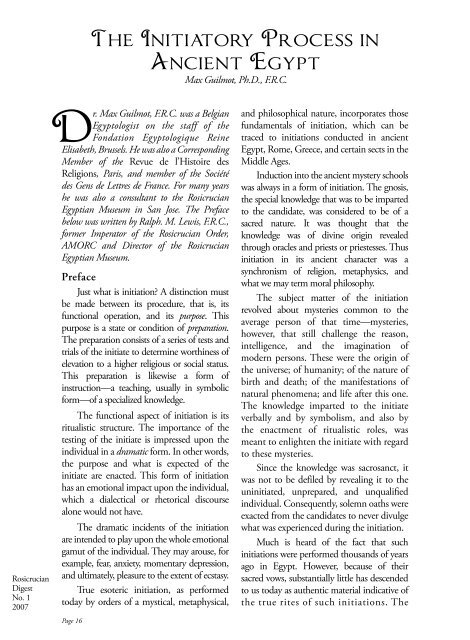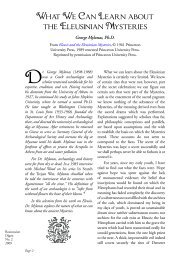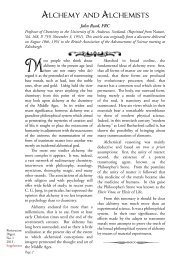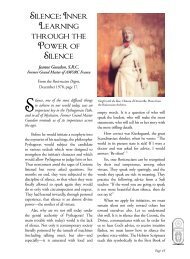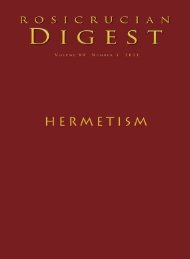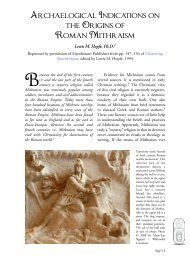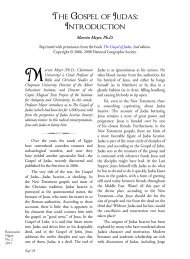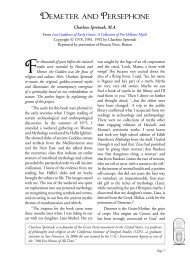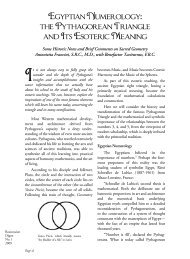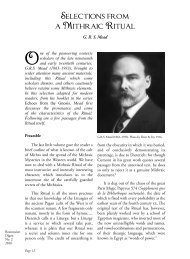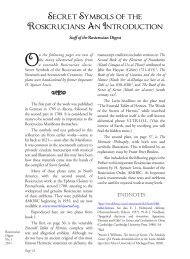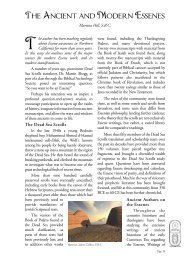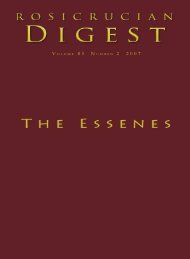Digest - Rosicrucian Order
Digest - Rosicrucian Order
Digest - Rosicrucian Order
You also want an ePaper? Increase the reach of your titles
YUMPU automatically turns print PDFs into web optimized ePapers that Google loves.
Max Guilmot, Ph.D., F.R.C.<br />
<strong>Rosicrucian</strong><br />
<strong>Digest</strong><br />
No. 1<br />
2007<br />
r. Max Guilmot, F.R.C. was a Belgian<br />
Egyptologist on the staff of the<br />
Fondation Egyptologique Reine<br />
Elisabeth, Brussels. He was also a Corresponding<br />
Member of the Revue de l’Histoire des<br />
Religions, Paris, and member of the Société<br />
des Gens de Lettres de France. For many years<br />
he was also a consultant to the <strong>Rosicrucian</strong><br />
Egyptian Museum in San Jose. The Preface<br />
below was written by Ralph. M. Lewis, F.R.C.,<br />
former Imperator of the <strong>Rosicrucian</strong> <strong>Order</strong>,<br />
AMORC and Director of the <strong>Rosicrucian</strong><br />
Egyptian Museum.<br />
D<br />
Preface<br />
Just what is initiation? A distinction must<br />
be made between its procedure, that is, its<br />
functional operation, and its purpose. This<br />
purpose is a state or condition of preparation.<br />
The preparation consists of a series of tests and<br />
trials of the initiate to determine worthiness of<br />
elevation to a higher religious or social status.<br />
This preparation is likewise a form of<br />
instruction—a teaching, usually in symbolic<br />
form—of a specialized knowledge.<br />
The functional aspect of initiation is its<br />
ritualistic structure. The importance of the<br />
testing of the initiate is impressed upon the<br />
individual in a dramatic form. In other words,<br />
the purpose and what is expected of the<br />
initiate are enacted. This form of initiation<br />
has an emotional impact upon the individual,<br />
which a dialectical or rhetorical discourse<br />
alone would not have.<br />
The dramatic incidents of the initiation<br />
are intended to play upon the whole emotional<br />
gamut of the individual. They may arouse, for<br />
example, fear, anxiety, momentary depression,<br />
and ultimately, pleasure to the extent of ecstasy.<br />
True esoteric initiation, as performed<br />
today by orders of a mystical, metaphysical,<br />
Page 16<br />
and philosophical nature, incorporates those<br />
fundamentals of initiation, which can be<br />
traced to initiations conducted in ancient<br />
Egypt, Rome, Greece, and certain sects in the<br />
Middle Ages.<br />
Induction into the ancient mystery schools<br />
was always in a form of initiation. The gnosis,<br />
the special knowledge that was to be imparted<br />
to the candidate, was considered to be of a<br />
sacred nature. It was thought that the<br />
knowledge was of divine origin revealed<br />
through oracles and priests or priestesses. Thus<br />
initiation in its ancient character was a<br />
synchronism of religion, metaphysics, and<br />
what we may term moral philosophy.<br />
The subject matter of the initiation<br />
revolved about mysteries common to the<br />
average person of that time—mysteries,<br />
however, that still challenge the reason,<br />
intelligence, and the imagination of<br />
modern persons. These were the origin of<br />
the universe; of humanity; of the nature of<br />
birth and death; of the manifestations of<br />
natural phenomena; and life after this one.<br />
The knowledge imparted to the initiate<br />
verbally and by symbolism, and also by<br />
the enactment of ritualistic roles, was<br />
meant to enlighten the initiate with regard<br />
to these mysteries.<br />
Since the knowledge was sacrosanct, it<br />
was not to be defiled by revealing it to the<br />
uninitiated, unprepared, and unqualified<br />
individual. Consequently, solemn oaths were<br />
exacted from the candidates to never divulge<br />
what was experienced during the initiation.<br />
Much is heard of the fact that such<br />
initiations were performed thousands of years<br />
ago in Egypt. However, because of their<br />
sacred vows, substantially little has descended<br />
to us today as authentic material indicative of<br />
the true rites of such initiations. The


